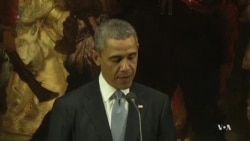THE HAGUE —
The Group of Seven industrialized nations has suspended Russia's membership, in response to its annexation of Ukraine's Crimea region. The action was called by U.S. President Barack Obama, who began a tour of Europe Monday in an effort to isolate Russia.
President Obama's official purpose for coming to the Netherlands is to attend the Nuclear Security Summit, but Russia's annexation of Ukraine's Crimean peninsula became the main focus.
Shortly after arriving Monday, President Obama briefly toured Amsterdam's Rijksmuseum before speaking to reporters.
“Europe and America are united in our support of the Ukrainian government and the Ukrainian people. We’re united in imposing a cost on Russia for its actions so far," said President Obama.
Those words turned into actions on the sidelines of the nuclear summit later in the day, when Obama hosted an emergency meeting of G7 leaders. In a joint statement after the meeting, the group condemned the Russian-sponsored referendum for Crimea to secede from Ukraine, and what it described as Russia's illegal attempts to annex the region. The leaders said they are ready to intensify sanctions they already have imposed if Russia does not change course.
A senior U.S. official said continued aggression, including incursions into eastern and southern Ukraine, could trigger deeper sanctions against banking, defense and other key sectors of the Russian economy. Concerns have mounted following reports that Russia is massing troops along the Ukrainian border.
Earlier, Deputy National Security Adviser Ben Rhodes told reporters Russia's future in the G7 group is in doubt.
“We believe there's no reason for the G7 countries to engage with Russia going forward based on its behavior," said Rhodes.
The leaders have cancelled their plans to hold an upcoming G8 meeting in the Russian Black Sea resort of Sochi, and will instead hold a G7 meeting - without Russia - in Brussels.
That is where Obama heads next. He will call on the EU and NATO to step up support for Ukraine's government.
President Obama also is looking beyond Europe for support in his effort to isolate Russia. On the sidelines of the nuclear summit Monday, Obama met with Chinese President Xi Jinping. Beijing has questioned Russia's actions in Ukraine. In a rare move, China last week abstained from a U.N. Security Council resolution declaring Crimea's Russian-sponsored secession referendum illegal.
Going into Monday's meeting with Obama, President Xi noted the two leaders have stayed in close communication and have been in agreement on a number of important issues.
A U.S. official said the Chinese leader affirmed that the principle of independence and sovereignty of nations is fundamental. China wants to see a diplomatic solution to the crisis, but is not considering sanctions.
The nuclear summit has brought together 53 nations to talk about global denuclearization. Although the focus has largely turned to Ukraine, there were some successes Monday in efforts to reduce nuclear stockpiles.
U.S. and Japanese officials announced that Japan will hand over hundreds of kilograms of highly enriched uranium that it has held for decades.
President Obama's official purpose for coming to the Netherlands is to attend the Nuclear Security Summit, but Russia's annexation of Ukraine's Crimean peninsula became the main focus.
Shortly after arriving Monday, President Obama briefly toured Amsterdam's Rijksmuseum before speaking to reporters.
“Europe and America are united in our support of the Ukrainian government and the Ukrainian people. We’re united in imposing a cost on Russia for its actions so far," said President Obama.
Those words turned into actions on the sidelines of the nuclear summit later in the day, when Obama hosted an emergency meeting of G7 leaders. In a joint statement after the meeting, the group condemned the Russian-sponsored referendum for Crimea to secede from Ukraine, and what it described as Russia's illegal attempts to annex the region. The leaders said they are ready to intensify sanctions they already have imposed if Russia does not change course.
A senior U.S. official said continued aggression, including incursions into eastern and southern Ukraine, could trigger deeper sanctions against banking, defense and other key sectors of the Russian economy. Concerns have mounted following reports that Russia is massing troops along the Ukrainian border.
Earlier, Deputy National Security Adviser Ben Rhodes told reporters Russia's future in the G7 group is in doubt.
“We believe there's no reason for the G7 countries to engage with Russia going forward based on its behavior," said Rhodes.
The leaders have cancelled their plans to hold an upcoming G8 meeting in the Russian Black Sea resort of Sochi, and will instead hold a G7 meeting - without Russia - in Brussels.
That is where Obama heads next. He will call on the EU and NATO to step up support for Ukraine's government.
President Obama also is looking beyond Europe for support in his effort to isolate Russia. On the sidelines of the nuclear summit Monday, Obama met with Chinese President Xi Jinping. Beijing has questioned Russia's actions in Ukraine. In a rare move, China last week abstained from a U.N. Security Council resolution declaring Crimea's Russian-sponsored secession referendum illegal.
Going into Monday's meeting with Obama, President Xi noted the two leaders have stayed in close communication and have been in agreement on a number of important issues.
A U.S. official said the Chinese leader affirmed that the principle of independence and sovereignty of nations is fundamental. China wants to see a diplomatic solution to the crisis, but is not considering sanctions.
The nuclear summit has brought together 53 nations to talk about global denuclearization. Although the focus has largely turned to Ukraine, there were some successes Monday in efforts to reduce nuclear stockpiles.
U.S. and Japanese officials announced that Japan will hand over hundreds of kilograms of highly enriched uranium that it has held for decades.





